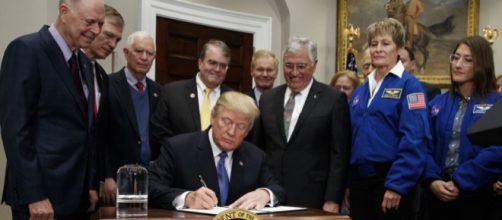President Donald trump has signed a new Space policy directive which he claims will "restore American leadership in space".
Trump's policy should see American astronauts on the moon for the first time since 1972, and could result in "an eventual mission to Mars and perhaps someday to many worlds beyond."
A mission to the moon is seen by many within the scientific community as a suitable stepping stone to a mission to Mars.
According to NASA, the new programme will "effectively organise government, private industry, and international efforts" allowing humans to travel to the moon and eventually explore Mars.
The policy follows a recommendation by the new National Space Council Chaired by Vice President Mike Pence back in October.
#OTD 45 years ago, Astronaut Harrison Schmitt landed on the Moon. Here, at a signing ceremony instructing NASA to send humans back to the lunar surface, he shows @IvankaTrump the Moon sample he collected in 1972: https://t.co/rgKiSVsr3B pic.twitter.com/h5deRQF3p9
— NASA (@NASA) December 11, 2017
Trump's directive marks a dramatic change from the space plans of the Obama administration, who shifted the target from the moon to other missions like sending humans to asteroids.
In a statement acting nasa Administrator, Robert Lightfoot said NASA "looks forward to supporting the president’s directive".
Notable dignitaries attending the signing ceremony included Sen. Harrison “Jack” Schmitt (one of the last men to have walked on the moon), Buzz Aldrin, and Christina Koch.
Space exploration could provide some much-needed good-press for Donald Trump who is not the first President to set his sights on getting Americans on the moon again. George W. Bush even advocated the establishment of a lunar colony during his presidency.
Space experts show overwhelming support
Industry experts reacted positively to the President's directive including chairman of the House Science, Space and Technology Committee, Congressman Lamar Smith who said a mission to the moon would "enable NASA to test new systems and equipment critical for future missions".
Aerospace company Lockheed Martin which has numerous contracts with NASA added that a lunar mission would inspire a "thriving new space economy" creating jobs and driving innovation.
The CEO of the Coalition for Deep Space Exploration Mary Lynne Dittmar pledged to support NASA in its future missions and congratulated the Trump administration for its "bold vision".
Space exploration has recently seen a significant increase in private investment with companies like SpaceX intending to take paying customers on a trip which would loop around the moon as early as 2018. Private companies like SpaceX and Boeing already have contracts with NASA and could play an integral role in future space travel.
Rocket and spacecraft for CRS-13 are flight-proven. Falcon 9’s first stage previously launched SpaceX’s eleventh resupply mission for @NASA, and Dragon flew to the @Space_Station in support of our sixth cargo resupply mission. pic.twitter.com/RY4F2TrWO2
— SpaceX (@SpaceX) December 6, 2017


